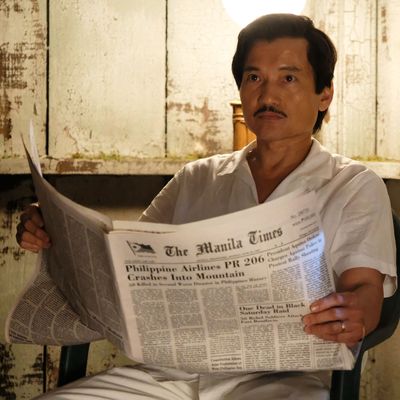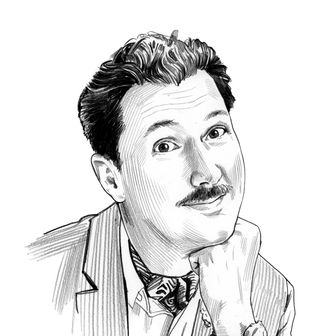
Here’s the most surprising thing about Gianni Versace: Even at the age of 10 in Calabria, Italy, he apparently spoke fluent English. He and his mother only speak English to each other, as does his Latin teacher at school and the one classmate who calls him a pansy. This must be an especially good school district, since it teaches English so well that Italians would prefer to speak it at home rather than their native tongue.
I’m teasing the show, of course, but how hard would it have been to translate the two scenes of Versace’s childhood into Italian and put in subtitles? Yes, I know we are all lazy and hate to read while we’re watching TV because it makes us look up from crushing unspeakable amounts of candy on our phone screens, but come on.
While we’re talking about unbelievable things, one of the jocks at Andrew’s school called him a “fag” for yelling in line at school picture day, but we’re really supposed to believe that no one would say anything when he shows up to a house party vogueing on the dance floor in a red leather jumpsuit like he’s Michael Jackson in the “Bad” music video? It’s appropriate that the house party was in 1987, because no house parties are as cool, crowded, or well-behaved, except for the ones in John Hughes movies that were coming out around the same time. Oh, and what happened to that nerdy blond guy who was going to ask Andrew out? He just disappeared, poor guy. He was just like Duckie in Pretty in Pink.
This episode is called “Creator/Destroyer,” but we get much more of the destroyer than we do the creator. It opens with Gianni sketching dresses in his mother’s atelier and her encouraging his love of fashion as a young boy, but she does it with the kind of platitudes that are usually reserved for motivational posters in sad cubicle farms. “You must do what you love, but it takes hard work and practice.” “Success only comes with hard work. And it’s never easy. And that’s why it’s special.” This opening is more like a Lifetime movie than it is a prestige show on an Emmy-winning cable network.
While the language and dialogue are rather silly, the worst part about this entire episode is that it lasts 90 minutes (with commercials). I’m all for cable channels letting their creators experiment with run times, but no one exploits this privilege like Ryan Murphy and his crew. “Creator/Destroyer” is boring, slack, and full of exposition that we didn’t really need.
Yes, there are lots of good parts, but did we need to see Lizzie talking to Andrew on the couch about how they’re both imposters? No. Did we need Andrew and his father saluting over the American flag in the front yard? No. Did we really need all those cringe-y moments of Andrew getting his yearbook photo taken and then crowing about it to his one friend we previously hadn’t met? No. We’re nearing the home stretch, and this needed to be a lot tighter to be more effective.
But we did learn some interesting things, mostly about Andrew’s father. Both Andrew and his father never felt like they belonged in the all-white, upper-class world to which they aspired, but Modesto (a.k.a. Pete) taught Andrew to fit in. While Versace’s mother taught him about hard work and persistence, Andrew’s father taught him “to remember that you’re special, and when you feel special, success will follow.” Both Andrew and Modesto felt special, but when success didn’t follow, they both got angry and became violent, thieving liars.
The best and most heated scene comes when Andrew finally tracks his father down to Manila after he’s fled the Feds for bilking old ladies out of their pensions. Andrew is crushed that his father’s success was all lies, that the superiority he based his personality on was all a sham. “You’re not upset that I stole, you’re upset that I stopped,” Modesto says. “Now you have to work. You are a sissy kid with a sissy mind.” He then spits on Andrew and tells him to stab his father with a knife to prove that he’s a man.
Maybe that is the essential difference between Andrew and Gianni. The show has taken great pains to paint them almost as equals — very intelligent, artistic, gifted, and bullied for being gay — but Andrew had a father who used his sexuality against him, whereas Gianni’s mother trained him to be a couturier regardless of what she thought it would say about her son.
The oddest thing about this hour, and the series in general, is that it seems to be suggesting this all wasn’t Andrew’s fault. It keeps trying and trying to make us feel sympathy for a man who killed multiple people in cold blood. Here, Andrew has a father who raised him with the wrong values and made him feel better than everyone else, even his long suffering older siblings. His father also taught him that lying and stealing were the only way to get ahead in America. Andrew was given the education and refinement to reach the upper echelons of society, but not the work ethic to make it stick (something that Norman brought up when they fought on the balcony of his house).
Does that mean that Andrew couldn’t help but become who he was, because he was a sensitive gay kid born to the wrong parents and living in a homophobic world? That can’t be the answer because no one forced him to become violent. Killing all of those people was his choice and he needs to be held accountable for that. Yes, the portrait of every killer might be more nuanced than the nightly news would lead us to believe, but there are plenty of people who escape troubled backgrounds without resorting to spree killing, so why couldn’t Andrew? Maybe next week’s finale will do a little bit more to tarnish the image the show has given him so far.
That’s the big question, isn’t it? After his confrontation with his father in Manila, Andrew says, “I will never be like you,” so what turned him into exactly the kind of person that Modesto was? We see it a little bit at the pharmacy, where he’s filling out a job application and the Filipino owner starts asking about his father. Andrew initially lies out of a sense of survival, because he feels like he won’t get the job if the owner knows that his father is a crook. But then his sense of superiority is dinged and he starts telling the owner that his father owns multiple pineapple plantations. It’s the very start of a road that will lead right to Versace’s front door.


